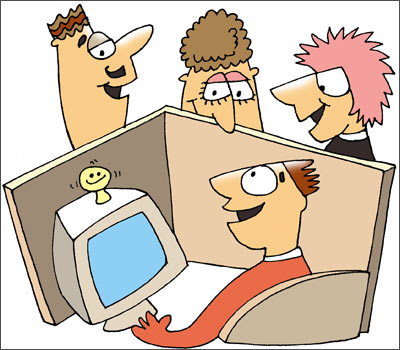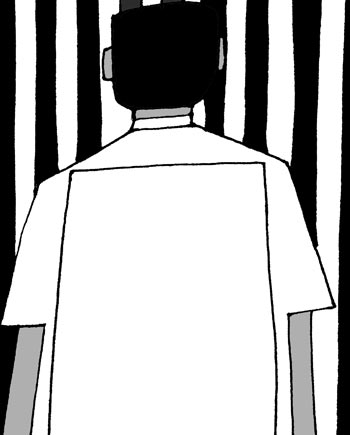 | « Back to article | Print this article |
How to improve your communication skills
Ever seen your team members at work getting defensive just as you were getting ready to talk? Ever been rejected at an interview even though you knew your answers were first grade? Ever seen people's eyes glaze over while you give a presentation?
In all likelihood, the fault lies not in your ability to do your job or how talented you are. It's probably the lack of communication skills that's keeping you from achieving the heights you know you can.
Often, people with poor communication skills find that no matter how hard they struggle to get ahead, they are, at the end of the day, swimming against the current. Nothing they do or say achieves results like their co-workers who have the all-important skill of communicating effectively tucked under their belts.
In all offices, there are those who just have to clear their throats and have the room turning in anticipation of what they're going to say, and those who could have the best idea of the year, but nobody apart from his neighbour knows it.
To help you make your way into the former group, and learn how you can improve your communication skills, rediff.com's Insiyah Vahanvaty spoke to some experts to see what they had to say.
Listen
Yes, listening is as much a part of communicating as talking is. If you don't listen, you give the other person the feeling of being ignored and unvalued, which leads to an instant drop in receptiveness.
According to Mukul Saxena, COO of 2KnowBiz Learning Services, "Young people these days are always in a hurry to be heard without listening to what other people have to say. They need to be a little more patient and hear other points of view, especially those that come from people more experienced than them."
Professor RSS Mani, a renowned HRD expert and management educator agrees. "Most young people are good at expressing themselves, but they seem to think that listening is tantamount to obeying and are resistant to it. Also, I've noticed that young people seem to have very short attention spans, which leads to distracted bursts of listening."
Read
Reading is a great way to keep your vocabulary and grammar fresh. Also, reading helps you learn different points of view, and helps you learn how to articulate your thoughts effectively.
Says Professor Mani, "Sadly, reading is a fast-dying habit. I always suggest reading to those who are trying to improve their communication skills. It helps improve language and vocabulary, as well as provide new perspectives to issues."
Saxena agrees, "Reading broadens horizons and gives people the diverse perspectives needed to talk to people of all kinds and ages. Also, one must keep in mind that good books are typically written by excellent communicators who can be modelled."
Speak clearly
If you see people losing interest, maybe you're going too fast
Enunciate your words. If you have to give a presentation, rehearse it beforehand, so you know what you want to say and can get your point across effectively. Keep your tone neutral and speak loudly enough to be heard.
If you see people losing interest, maybe you're going too fast. Pause. Take a moment before starting to talk again.
In written communication, remember that your objective is to get your message across, not sound impressive. Write in simple, clear, and easy to understand language.
"I often find that in order to make a document sound impressive and stylish, people tend to use jargon and technical words that actually only serve to get in the way of communicating the message effectively. Remember, simplicity is the key to effective communication", says Professor Mani.
Manish Porwal, CEO of Percept Talent Management agrees. "Words have meanings: 'same' is not 'similar' and there is a reason why it is 'similar' and not the 'same'. Having more words in your vocabulary but using them sparingly and accurately, without excessive jargon, is the way to communicate better with your audience."
Make eye contact
Body language
Many young professionals give themselves away because of their body language
Only a part of your message comes from your words -- much of it comes from your body language.
Be relaxed and open to what others have to say. Don't cross your arms across your chest -- that signifies a closed mind. Don't gesticulate excessively -- it shows you are nervous.
Smile, hold eye contact and speak calmly and clearly.
Professor Mani has seen many young professionals give themselves away because of their body language. "If a person is leaning back, sprawled out in his chair, and looking around the room while you're talking, it's quite evident that they are not listening. If they refuse to meet your eyes and keep looking away while talking to you, it makes you wonder what they are trying to hide!"
Practice
Rehearse your presentations, it'll help you beat nerves
Yes, you can practice communicating effectively, and it's the one thing that can help you get better at it.
Making a presentation? Rehearse it with your friend the day before.
Important meeting tomorrow? Communicate your ideas to a friend or colleague and check whether they understand your thoughts exactly the way you intended them to.
If you think you would like a more structured approach, enroll yourself in a public speaking course, or a personality development course. These help to overcome shyness and increase confidence levels. They will also help you identify your strengths and weaknesses.
Finally, remember that some are born with great communication skills, and don't need to work on them at all. For the rest of us, there is still hope. A little effort, attention and practice can go a long way.






